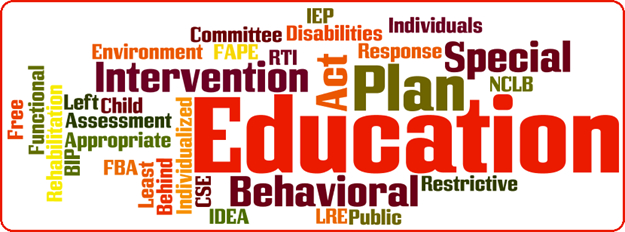
THE INDIVIDUALIZED EDUCATION PROGRAM
(IEP)
The IEP is a written document created for each student in a public school
who receives special education programs and services.
There are three basic reasons for the IEP:
1) to identify the student’s needs,
2) to set goals that are important and possible for the student, and
3) to put services in writing that a school district will provide for a student.
The Individuals with Disabilities Education Act (IDEA) requires certain information be in the IEP. IEP forms can look different, but must include:
1. Present levels of academic achievement and functional performance (PLAAFP), which is information on how your child is doing in school and how his or her disability may affect progress in the general education curriculum.
2. Yearly goals for your child that the IEP team thinks your child can meet in a year.
3. A description of how progress on yearly goals will be measured for your child.
4. Special education and related services (such as speech and/or occupational and/or physical therapy), including supplementary (or additional) aids and services your child will get at school (also called accommodations).
5. Amount of time during the school day, if any, your child spends apart from his or her peers without disabilities.
6. Your child’s participation in alternate state and district tests, or accommodations related to the state test.
7. The projected start date for the services and modifications for your child, and where, how often, and how long they are provided.

THE IEP TEAM
A team to support your child’s IEP will be set into place. Required members of the IEP team include a general education teacher (if your child will participate in a general education setting), a special education teacher or service provider, a district representative, and someone who
can interpret evaluation results.
Other district and school staff may also attend if appropriate.
The team is different for each child depending on the child’s needs.
As the parent, you are also a team member and must be invited to each IEP team meeting. The school will make a reasonable attempt to have a meeting when you can attend.
The IEP team may also include other people invited by you or the school, such as other family members, advocates, students, peers, or evaluators.

